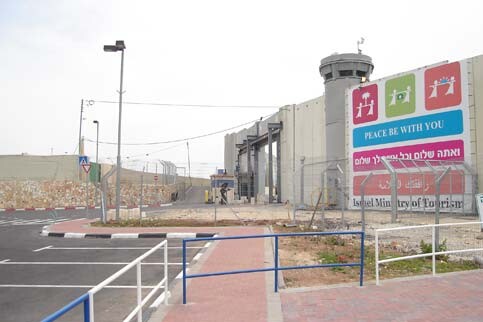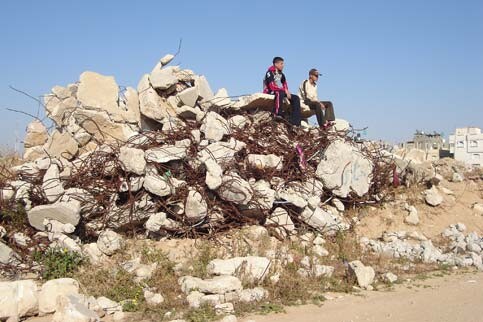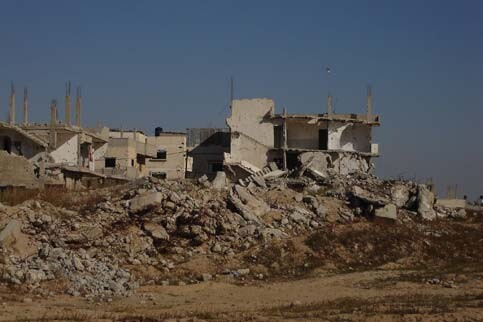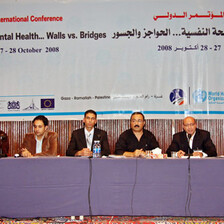The Electronic Intifada 18 May 2006

A sign on the Apartheid Wall proclaims, “Peace be with you.” (David Halpin)
The 360 square kilometers of the Gaza Strip represent 1.5% of “mandate” Palestine. Another 3 million Palestinians live in the ineptly named “West Bank,” and in East Jerusalem. This represents about 11% of mandate Palestine. Two-thirds of the 1.4 million people in the Gaza Strip are refugees and their offspring. The former had fled southwards from their homes and land in 1948 before and during the “Arab-Israeli war.” The massacre of Deir Yassin on April 9th was a central cause of the panic that drove that mass migration, as well as overwhelming force of arms. The refugees were given materials for building concrete shelters in ‘camps’ throughout the Strip. They were cheek by jowl, and cold in winter. In spite of UN resolutions 194, 242 and others, they have remained trapped in an utterly oppressive environment.
Since the start of the second intifada in September 2000, the standard of living has dropped steadily. Unemployment has been over 50% and is rising quickly now. 78% of the population are living under the poverty line of less than US $2.10 per person per day, and 10% of children under the age of five suffer from chronic malnutrition. [1] A study in late 2002 found that 17.5% of children aged 6–59 months suffered from chronic malnutrition, and 53% of women of reproductive age and 44% of children were found to be anaemic. [2]

Two Palestinian boys look out on the Salah’din road to Rafah. (David Halpin)
The Israeli Occupation Force withdrew its armed presence and 8000 colonists in September 2005 from the Strip, but the occupation went on. Tight control of the border crossing points has continued, including at Rafah’s border with Egypt. Overflights by military “drones,” Apache helicopter gunships and F-16s persist. The latter were used to cause sonic booms at low levels last autumn. The mental injury to adult and child triggered a petition to the Israeli Supreme Court. [3] The distance from shore within which Palestinians are allowed to fish is set by the occupier, and Palestinian access to the sea is sometimes banned completely. Thus, an important source of high quality protein is limited. A commercial seaport was being built in Gaza in the 1990’s, but that was bombed in 2000, as was Gaza’s airport.
In January 2006, Hamas received 43% of the votes in scrupulously clean elections. [4] From the January elections, Hamas gained 74 of the 132 seats in the legislature. Hamas, founded in 1987, has been proscribed as a ‘terrorist’ organization by the United States because of its charter, that does not recognize the Israeli state, and because of its use of suicide bombing since 1994. However, it has maintained a ceasefire with the occupier for 18 months. It has energetically led social and educational projects, especially in Gaza. It has widespread support within the populace which wishes to stand with sumoud (“steadfastness”). Ground has been lost, both literally and metaphorically; in response, the people demand “not one grain of sand more!”
An already dire state of affairs was quickly exacerbated as agencies and governments blocked aid to the Palestinian Authority. Taxes amounting to $50 million per month that are due to the Palestinian government have been withheld by the State of Israel and financial support by the EU ceased. The latter amounted to one-half billion euros in direct and indirect aid per year.

Destruction in Rafah in Gaza caused by the Israeli army. (David Halpin)
The US has driven this policy of isolation with the clear intention of destabilising the elected government, in order to force its overturn. There is no money to pay the 150,000 public servants within the “West Bank” and Gaza Strip, including doctors, nurses and other health workers. Most have not been paid for two months. There is very little money in circulation. High quality fruit that has been grown for export has been allowed in only small amounts through Karnai, the commercial checkpoint. No other exports are passing through, and little is coming in. That includes drugs, spare parts for dialysis machines and other necessary medical equipment and supplies. There are no drugs and anaesthetic agents left in the hospitals. Shafa hospital, the main public hospital, was threatened with closure last week. Dr. Moawiya Hassanein at the Ministry of Health (MOH) reported on 7 May 2006 that Israeli Occupation Forces (IOF) prevented 274 patients last month from passing through the Erez checkpoint to receive vital medical treatment in the hospitals of the West Bank and Israel. He added that they suffer from critical diseases such as cancer, leukemia, and cardiac disease. They are in need of surgery, and urgent, advanced medical treatment.
To this economic siege has been added the firing of tens of thousands of shells [5] into “open ground” for over two months by artillery, tanks and ships. These fall into one of the most densely populated areas in the world. The ostensible purpose is to quell the firing of the primitive and unguided Qassam rockets, which have killed thirteen Israelis in the last two years according to B’tselem. [6] This Israel-based organisation states the indiscriminate nature of IOF’s firing of shells makes their firing a war crime, especially when it is close to Palestinian residential areas. It points out the shelling is a disproportionate response and an inappropriate one, given that these rockets are fired from varying positions. There has been considerable loss of life and limb. In the first fortnight of April, 16 were killed. On 16 April 2006, B’Tselem, along with other Israeli and Palestinian human rights organizations, petitioned the High Court of Justice to cancel the IDF order reducing the safety zone for shells fired into the Gaza Strip to only 100 meters from civilian objects. The petitioners argued that the weaponry is not precise and reduction of the safety zone endangers civilian lives. On 10 April, after the range had been reduced, seven-year-old Hadil Ghiban was killed by a shell that struck her house. The blast also injured twelve members of her family. Gaza Community Mental Health Programme (GCMHP) has documented mental injury to children caused by the noise and shock of shell explosions. In addition to these war crimes, extra-judicial assassination of Palestinian resistance leaders occurs without abatement, often wounding and killing bystanders as well. This is usually done by rocket from Apache helicopters or unmanned aircraft.
It is unconscionable and unprecedented that nations who are signatories to the Fourth Geneva Convention and the UN Charter should be instruments in a siege which is causing suffering and loss now, and which will lead to a humanitarian disaster, including the potential for an epidemic disease.
Under international humanitarian law, Israel, as an occupier, must protect the wounded, sick, children, and pregnant women, enable the free passage of medicines and essential foodstuffs, enable medical teams to provide assistance, and not impose collective punishment. Under international human rights law, Israel must respect the right of every person to freedom of movement, to work, to an adequate standard of living, to education, to adequate health care, and to family life.
The Fourth Geneva Convention of 1949 relative to the Protection of Civilian Persons in the Time of War, states in its first article - “The High Contracting Parties undertake to respect and to ensure respect for the present Convention in all circumstances.” In addition, Article 146 of the convention outlines specific obligations of contracting parties, including undertaking legislative procedures, to pursue those suspected of committing serious violations, and to bring them to trial or hand them to a third party interested in bringing them to trial.
The 25 countries of the EU have an additional obligation in that the second article of the EU-Israel Association Agreement states that “[r]elations between the Parties, as well as all the provisions of the Agreement itself, shall be based on respect for human rights and democratic principles, which guides their internal and international policy and constitutes an essential element of this Agreement.” [7]
The EU Commissioner, Ms. Ferrero-Waldner, is currently negotiating ways to get money into the hospitals and schools without it “touching” the Hamas dominated Palestinian Authority. AIDA and other NGO groups have spoken strongly against this as being inefficient and destabilising. There are large amounts of money from Arab nations and individuals which are sitting in Cairo and elsewhere because Arab banks fear draconian sanctions by the US if they break the siege.
International law is clear as to the situation obtaining in Gaza today. There is no requirement to negotiate “solutions,” but for these unlawful actions to cease forthwith.
David Halpin is a retired orthopaedic and trauma surgeon. He chartered the Voyage of the Dove and the Dolphin in 2003. The MV Barbara, a chartered Danish vessel, traveled from Torquay in the UK to Ashdod with 50 tons of first grade flour, milk powder, cooking oil, olive oil, honey and cheese destined for the poorest families in Gaza. The voyage was a symbolic protest against the long continued and grotesque injustices being done to the Palestinian people, and against the massive assault on Iraq which was only 6 weeks away. He has since visited Palestine four more times.
Footnotes
[1] Jan Coffey – Save the Children UK Programme Manager at press conference with 31 other international aid agencies meeting (AIDA) in Jerusalem on 4-05-06.
[2] John Hopkins and Al-Quds Universities for Care International.
[3] Gaza Community Mental Health Programme (GCMHP) and Physicians for Human Rights -Israel (PHR): Joint Press Release 14-11-05
[4] Jimmy Carter: ‘Punishing the innocent is a crime’ 05/07/06 International Herald Tribune
[5] Conal Urquhart:Observer 7-05-06
[6] B’tselem: http://www.btselem.org/english/Special/20060426_Gaza_Status.asp
[7] Palestinian Committee for Human Rights: http://www.pchrgaza.org/Interventions/poss_april_06.htm
Related Links


